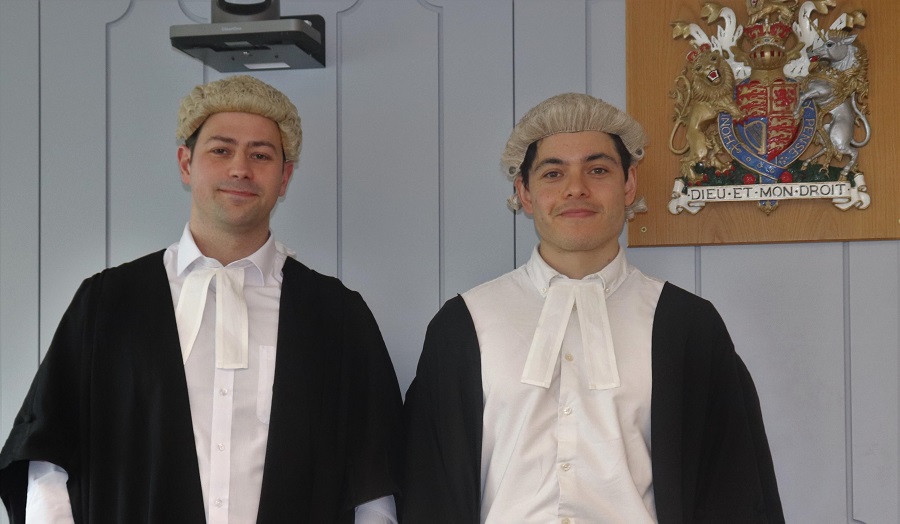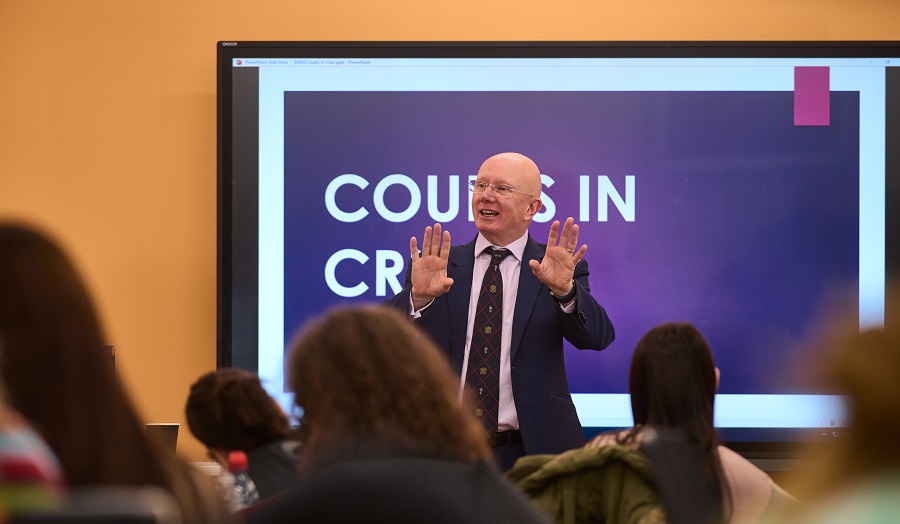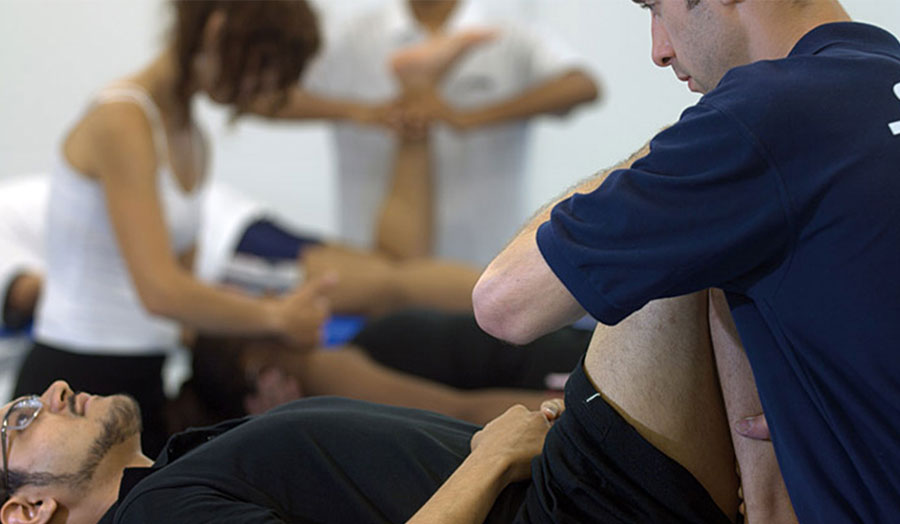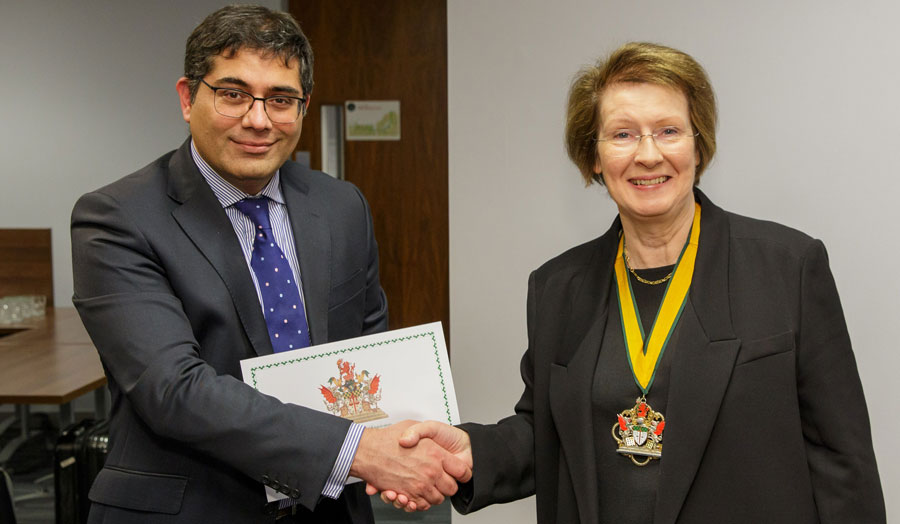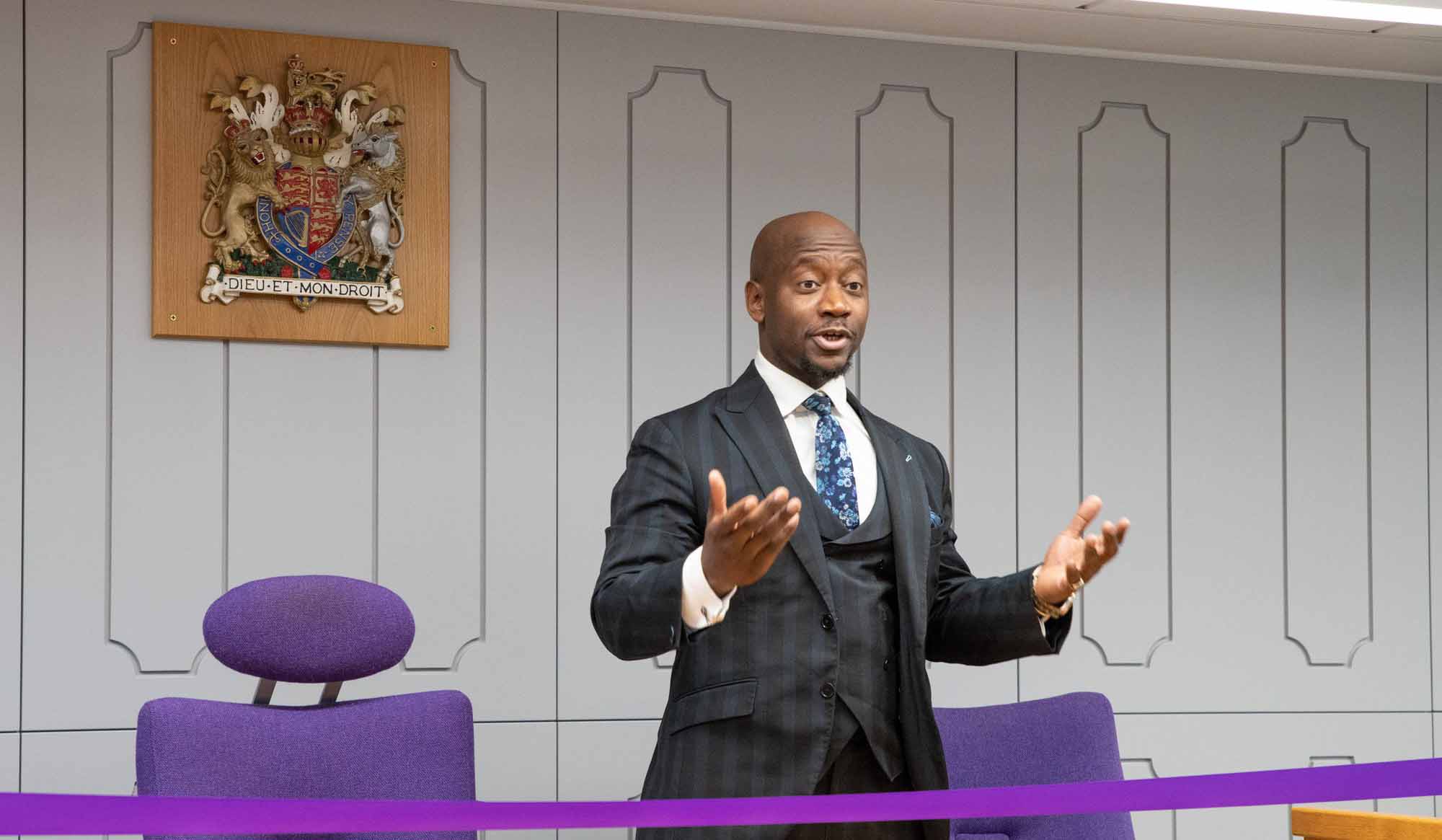Apply for this course
Please select when you would like to start:
Use the apply button to begin your application for the Media Law LLM. Please note, the following PG Cert and PG Dip options are also available:
Apply for the PG Cert
Apply for the PG Dip
If you require a Student visa and wish to study on a part-time basis, please read our how to apply information for international students.
Why study this course?
This course has been designed to address the growing demand for practitioners in the media sector who want to understand legal issues surrounding the industry such as copyright law, advertising law, media ethics, privacy and data protection.
You’ll learn remotely, giving you the freedom to study from wherever you are in the world. You can choose to study this subject as a LLM (Master of Laws), postgraduate diploma or postgraduate certificate.
Study in a way that suits you
You’ll learn remotely, giving you the freedom to study from wherever you are in the world
Take your career prospects to the next level
This course is suitable if you have either a legal background, or if you have a media background and want to learn about the legal issues affecting the industry
Learn from industry professionals
We ensure that your tutors and lecturers have strong relevant backgrounds in both the academic world and in legal practice with experience as barristers or solicitors
Course modules
The modules listed below are for the academic year 2024/25 and represent the course modules at this time. Modules and module details (including, but not limited to, location and time) are subject to change over time.
Year modules
Law Dissertation
This module currently runs:summer studies - Wednesday evening
(alternative core, 60 credits)
This module is a supervised research-based dissertation in a relevant subject of the student’s own choice, subject to the approval of the Course Director.
The dissertation module comprises support and interactive ‘one to one’ supervision between students and supervisors. The minimal expectation for contact between student and supervisor is around 5 hours, but this can be greater depending on the individual dissertation and specific needs of the supervisor.
MODULE AIMS
On successful completion of this module, you will be able to:
- write a level 7 dissertation of up to 12,000 words in length.
- demonstrate a grounded and evidenced understanding of appropriate research questions, materials and examples suitable for writing a dissertation in a legal area.
- employ appropriate techniques for information gathering, research and critical analysis of leading legal questions.
- adopt a structured approach to the production of a sustained and critical piece of academic research of between 10,000 to 12,000 words on a law related subject.
- practise the fundamental academic and professional skills necessary for practical and effective postgraduate study of law.
Law Experiential Learning Project
This module currently runs:spring semester - Wednesday evening
summer studies - Wednesday evening
(alternative core, 60 credits)
This module provides you with the opportunity to showcase your professional skills in the execution of law-related tasks and experiential learning. When executing legal tasks, successful practitioners are able critically to evaluate law-related matters from an elevated perspective and are able to draw upon a varied knowledge base to assist in the development of strategy, new ideas, recommendations and solutions that add value to their organisation. Furthermore, successful legal practitioners draw upon a wide range of knowledge to help shape their own behaviour, character and identity. By critically reflecting on their experiences in work, they are able to develop an acute awareness of their own capabilities and skills, and have the ability to understand how they personally add value to an organisation. It is the application of knowledge and utilisation of professional skills that is explored in this module.
The first week of the year long programme will be dedicated to the discussion of various aspects of the work placement. This will lead to the production of a substantial report that helps to investigates specific legal issues within an organisation. This is a significant independent project, where you determine the subjects to be investigated and the methodology to be followed. Your project is an ideal opportunity to seek out and draw upon a wide range of knowledge, and for you to demonstrate how this underpins any final conclusions and recommendations. Your project will help you demonstrate your ability to think and act independently when executing a complex and challenging task.
The remaining period is dedicated to experiential learning in a work placement or project with an employer, which you will have secured during your time on programme. This practical experience will allow you to explore and test your own professional competence in a specific working environment. You will maintain a Professional Development portfolio of your experiences and will, ultimately, be able to articulate your understanding of how you personally add value in a professional legal context. Again, you will be expected to draw on a wide range of knowledge to help evaluate and explain your experiences.
Module Aims
On successful completion of this module, you will be able to:
- carry-out an in-depth project where you can integrate the legal knowledge and professional skills you have gained throughout your programme;
- identify and utilise different types of legal knowledge to influence your thinking or action;
- develop robust legal research skills and an ability to formulate new ideas and solutions through the analysis of primary and/or secondary data;
- explore your own skills, character and identity within a professional environment and identify key attributes that will aid long-term success in your chosen career field;
- develop good reflective practice, ensuring models and concepts can be used effectively in the critical evaluation of your performance; and
- integrate knowledge, experience and reflective practice to continually develop your professional skills and competence.
Advertising Law
This module currently runs:autumn semester - Tuesday evening
(option, 20 credits)
Advertising is a multi-billion-pound industry with an international platform trying to work coherently within the legal perimeter governing multiple industries and jurisdictions.
Students on this module will develop a comprehensive understanding of the legal issues attached to advertising in business and society, and specifically the challenges faced by the advertising industry as these relate to media, including interactive media. In order for businesses to be successful there needs to be effective marketing of the company, product or service, but all businesses have a legal duty to ensure all advertising claims or representations they make are within the perimeter of the law and so are not deceptive or untruthful in any way. Some of the principal concepts of advertising law include truth in advertising and unfair trade practices. These are the laws regulating how businesses relate the benefits of their products to the general public.
Advertising laws can have a significant impact on a number of business operations and this module explores these issues in detail in respect of media -related issues.
MODULE AIMS
On successful completion of this module, you will be able to:
- understand the complexities surrounding advertising and the law;
- understand why consumers need protection when being exposed to advertising;
- understand specific advertising rules in terms of media;
- understand the difficulties facing jurisdictional based advertising and to develop an understanding of the regulatory bodies governing different aspects of advertising law specifically relating to the media and entertainment;
- have the opportunity to apply knowledge through a series of practical exercises;
- understand the issues and the concerns relating to direct marketing activity and to consider various approaches to ensure compliance with regulations, balanced with the desire to maximize marketing revenue;
- develop their ability to construct legal arguments.
Defamation
This module currently runs:autumn semester - Tuesday evening
(option, 20 credits)
Anyone working in the media is susceptible to making unproven allegations against the people in the news which later turn out to be unfounded, whether or not this is done deliberately. Although it may seem to be reprehensible to besmirch the reputation of an innocent person, there may be public interest in hearing unproven allegations, and the journalist in question may thus escape liability. This is the complexity of the tort of defamation, which it is vital for anyone working within the media to understand.
The aim of this module is to provide students with a comprehensive knowledge of the law of defamation in the United Kingdom. It will examine the different forms of defamation and the requirements to establish whether defamation has occurred together with the remedies and defences that could be employed.
This module will also examine the legal ramifications of the legislation now in place to regulate the common law tort. As the Defamation Act 2013 aims to ensure that a fair balance is struck between the right to freedom of expression and the protection of reputations, it is imperative that you understand these different areas of law. You will examine the role played by different online platforms, e.g. social media and website operators, in the facilitation of defamation and the liability attached to all those involved in the process.
MODULE AIMS
On successful completion of this module, you will be able to
- understand the legal, social, and cultural context underpinning the law and policy relating to defamation;
- explain the historical developments of the law of defamation and the common law.
- explain the importance placed on protecting individual’s reputations from falsified malicious publications.
- analyse how the employment of ECHR may affect the outcome of a defamation case.
- critically evaluate case study-based problem questions;
Ethics, Values and the Media
This module currently runs:spring semester - Tuesday evening
(option, 20 credits)
Media ethics is an expansive idiom, trying to illustrate the ‘proper’ modes of behaviour governing all divisions of the modern-day media. Different branches of the media are governed by different ethical standards to which they need to adhere. Media ethics is a complex area of studies due to different media streams can be contradictory in nature. Many of the complications arise from the constant battle between the ethical standards and the media corporations need to increase revenue. Due to the wide differences between different media outlets, there is not any single rule to which to adhere, as while one rule may be sufficient for one media outlet it may be incompatible for a different stream.
The media sector in which ethical issues have been most prominent relates to the abusive research and reporting methods of some parts of the press, culminating in the controversial Leveson Report in 2012, which is therefore central to this module. This 2,000-page report is the most important tract on media ethics of modern times, and no study of this area would be complete without considering its findings, recommendations and consequences.
MODULE AIMS
On successful completion of the module, you will be able to
- appreciate the history of ethics, and its application in practice to mass media professions;
- critically analyse the laws and legal principles that guide professional practice;
- synthesise personal ethics and professional norms; societal limitations imposed by law, and self-limitations imposed by moral standards and ethical reasoning;
- appraise the balance between freedom and the ethical and legal responsibilities of professional communicators;
- appreciate the moral responsibility of professional communicators to make a positive difference within their sphere of influence;
- critically evaluate current policies and practice in relation to ethics within the media.
Intellectual Property Law
This module currently runs:autumn semester - Tuesday evening
(option, 20 credits)
The purpose of this module is to provide students with a broad understanding of what intellectual property is and the issues attached to the notion of protecting ‘creations of the mind’ with regards to the effect being felt due to new media sources. It will be focusing on English law but will touch upon the international conventions which also providing protection. There will be a number of elements considered, including assignments, licences and international arrangements, contracts, disclosure of confidential information, passing off, web addresses and domain name disputes.
Students will develop their legal writing with use of legislation, common law and EU Law. This module will also test students’ ability critically to analyse case-study based problem questions.
MODULE AIMS
On successful completion of this module, you will be able to:
- analyse basic intellectual property concepts and precedents;
- explain how IP law seeks to balance the interest of the owners of IP and the interests of the wider society;
- critically discuss the legal, social, and cultural context underpinning IP and media law policy;
- understand the relationship between IP and brand protection;
- relate relevant IP concepts and cases in contemporary media management issues and cases;
- understand the current challenges to existing models of IP exploitation in the context of digital interactive environments;
- critically evaluate case study-based problem questions;
- construct legal writing with the employment of media law cases.
Privacy and Human Rights
This module currently runs:spring semester - Tuesday evening
(option, 20 credits)
This module examines the extent to which English Law protects people from the invasion of their privacy. This is of particular concern to those involved in the media, where reporting on the private lives of celebrities and other people unwittingly caught up in the news is big business: indeed it is often the entire business of tabloid newspapers and gossip magazines.
The concept of privacy has itself proved to be problematic as it may be both socially and culturally specific. We need to consider therefore what – if any – are the precise aspects of privacy that English Law seeks to protect. The basic requirements of individual autonomy are that people have the right to determine for themselves how they live their lives and the right to be left alone to do it.
However, the media also have a particular interest in its rights to freedom of expression and freedom of the press, and these have frequently come into conflict with the rights of people in the news to a private life.
A related but distinct issue is the right to data privacy under the General Data Protection Regulation. You will therefore also critically analyse the effect that this has had on the media.
MODULE AIMS
On successful completion of this module, you will be able to:
- understand the legal, social, and cultural context underpinning the law and policy relating to privacy law;
- understand the potential tortious and human rights repercussions inherent in the use of private information;
- relate relevant concepts and cases in contemporary media reporting;
- understand the current legal challenges relating to the exploitation of private information;
- critically evaluate case-study-based problem questions;
- analyse the effect of the GDPR on the media sector.
Research Methods for Lawyers
This module currently runs:autumn semester - Wednesday evening
spring semester - Wednesday evening
(option, 20 credits)
Research Methods for Lawyers, which is offered in both the autumn and spring semesters, provides a detailed understanding of how to prepare for writing a dissertation on a legal topic.
Students will be given practical guidance on how to conduct advanced legal research from both primary and secondary sources; how to choose a viable research topic; how to write a research proposal; how to conduct a literature review; and how to choose the right methods and methodology for the dissertation.
In doing this, the students will be preparing themselves for conducting legal research in both an academic and professional field, as well as for writing a research dissertation at Level 7.
MODULE AIMS
On successful completion of this module, you will have:
- acquired advanced knowledge of how to conduct independent legal research and how to organise, assemble and synthesise large amounts of legal material in order to identify legal problems.
- developed several key transferable skills, including independent research, critical analysis and cogent academic writing in the context of writing a research dissertation, emphasising the use of primary and secondary sources.
- enhanced your employability by the development both of these skills, and by the practice of written communication activities (including summative) and oral communication activities (formative only)
Social Media and the Law
This module currently runs:spring semester - Tuesday evening
(option, 20 credits)
Due to the rapid expansion of social media and the outreach of those who employ it, it is having an unparalleled effect in regards to its potential to influence, harm, offend or impede the individual rights of others, as well as on people breaking laws sometimes without the knowledge of the legal repercussions that will follow. For example, the growth of social networking sites has seen the number of defamation cases increase exponentially.
This emerging area of law is not just concerned with civil actions being brought forward: there has been an upsurge in criminal cases due to people’s activities online - harassment, impersonation and sending malicious communications - all of which can lead to large fines or prison sentences. These are just some of the effects the misuse of social media sites is having on society.
The module aims to develop a detailed appreciation and understanding of the legal issues raised by the growing importance of social media in the business context. As a key area affecting the media sector this module is designed to provide essential legal coverage of a major contemporary area of modern life.
MODULE AIMS
On successful completion of this module, you will be able to
- understand the legal, social, and cultural context underpinning the law and policy relating to social media law;
- understand the potential tortious, contractual and criminal repercussions inherent in the use of social media;
- relate relevant concepts and cases in contemporary social media management issues and cases;
- understand the current legal challenges relating to social media exploitation;
- critically evaluate case study-based problem questions;
- construct legal writing with the employment of social media law cases.
The English Legal System and Commercial Law
This module currently runs:autumn semester - Wednesday evening
spring semester - Wednesday evening
(option, 20 credits)
You may be coming to this course with no prior knowledge of the components of the English legal system, or only a vague idea of how litigation and alternative dispute resolution operates within that system. Whilst it is possible to study a specific area of law without this broader knowledge, you will get a great deal more out of the course if you can contextualise it within the framework of legal practice, especially insofar as it relates to civil law and procedure.
This module will introduce you to the workings of the English Legal System in its historical, contemporary and international context. You will also have an introduction to aspects of commercial law, including contract and tort.
It includes the study of the sources of law; the law-making process; the institutional and court structure; and basic issues of civil procedure within the English Legal system.
You will also benefit from an introduction to legal method, which will introduce you to methods of legal research, analysis and logic; to a practical knowledge of the legal profession and careers; and to issues of judicial ethics.
MODULE AIMS
On successful completion of this module, you will be able to do the following:
- Reflect on the legal system in the context of contemporary legal issues.
- Demonstrate a working knowledge of legal language, sources of English law and legal procedure;
- Read and understand primary and secondary sources of law (paper based and electronic);
- Practise the fundamental academic and professional skills necessary for practical and effective postgraduate study of law.




